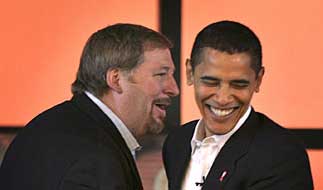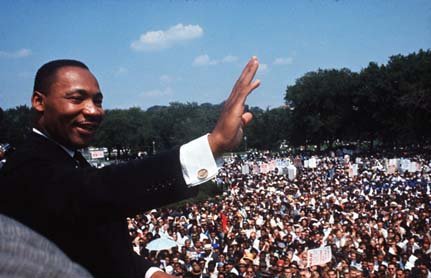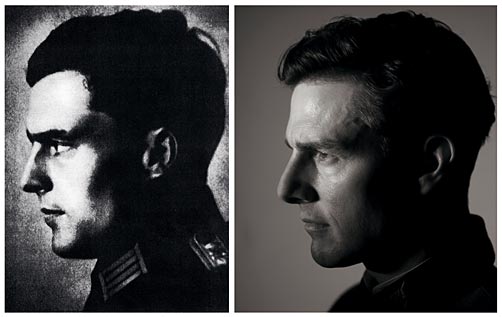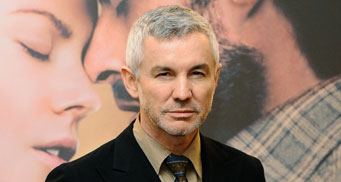
It took awhile to get here, but
Gus Van Sant’s timely and vibrant biopic Milk, which I caught on Christmas day, is well worth the wait. In a year that witnessed a
former community organizer take his message of hope all the way to the White House, and saw a majority of Californians vote for
legislating and invalidating their neighbors’ marriages (my favorite pin: “
Can we vote on your marriage now?“),
Milk couldn’t feel any more of the moment. (If anything, I wish
Milk had come out before the Prop 8 vote, when it might’ve done some good.) Arguably the best film about the realities of politics since
Charlie Wilson’s War,
Milk is blessed with excellent performances across the board — most notably Sean Penn, James Franco, and Josh Brolin, but also supporting turns by Emile Hirsch, Alison Pill, and others. And as a chronicle of a key moment in an ongoing civil rights struggle,
Milk also feels like a watershed film of its own in its approach to its gay and lesbian characters. In short, it’s one of the best films of 2008.
“My name is Harvey Milk, and I want to recruit you.” So began the oft-repeated speel of the San Francisco city supervisor and “Mayor of Castro Street,” who, in 1977 and after several attempts, became the first openly gay official elected to office in the US. But, seven years before those heady days, Milk (Sean Penn) was just a 40-year-old insurance man (and Republican, even), living a closeted life of quiet desperation in NYC. After a chance encounter and illicit proposition becomes an impromptu birthday party, Milk and new beau Scott Smith (James Franco) fall in love, talk about starting over, and decide to go West. Life is peaceful there…or is it? Even as Milk’s camera shop in the gay-friendly Castro district becomes a salon of artists, thinkers, and free spirits, bigotry is rampant even in the streets of San Francisco, and the cops at best turn a blind eye to — and at worst actively participate in — antigay violence. No more, says Milk. Taking a page from the ethnic political machines of an earlier century, he organizes Castro’s gays and lesbians into first a protest movement and then an organized voting and boycotting bloc. And when a redistricting plan emphasizing community self-rule in San Francisco is put into effect, Milk becomes an actual, legitimate political wheeler-and-dealer, with all the benefits and aggravations attending. (For more on the man and the movement, see the 1984 documentary The Times of Harvey Milk, now on Hulu for free.)
But, even as Harvey Milk rises to power in San Fran, a parallel movement stirs amid the churches and suburbs of Orange County. Led by former beauty queen, singer, and orange juice shiller Anita Bryant, the ever-so-Christian “Save Our Children” campaign gathers steam across the nation in its quest to roll back what meager protections gays and lesbians have managed to establish over the years. And when conservative state senator John Briggs (Denis O’Hare, seemingly forever destined to play assholes) brings the fight west in the form of Proposition 6, an initiative that would ban gays and lesbians from public schools, the battle for California is on. And even as Milk becomes the poster boy against Prop 6 and for recognizing gays and lesbians as full citizens and fellow human beings, he has to contend with trouble on the homefront — not only in his personal life (his new boyfriend Jack (Diego Luna) is more than a little erratic) but in his political backyard, where supervisor Dan White (Josh Brolin), from the Catholic, working-class district next door, is starting to act increasingly unstable. (But, I guess this is what happens when society is so permissive as to let a man get all hopped up on twinkies.)
Which reminds me: A word of appreciation for Josh Brolin’s work here. Sean Penn is garnering kudos across the board, and a likely Oscar nod, for his portrayal of Milk, and they’re very well-deserved. It’s really an astonishing transformation Penn accomplishes here — not so much because he’s playing someone who’s gay (homosexual), but because he’s playing someone who’s gay (happy).This is the same guy who sulked through Mystic River?) And, while Brolin will likely — and, imho, justifiably in the end — get edged out for Best Supporting Actor by Heath Ledger for The Dark Knight, his work here suggests he’s got some serious chops. At first it seems as if Brolin will just be coasting on his recent Dubya impression — another good-natured, hard-hearted conservative fratboy for the resume. Then, just as you think Brolin’s endangering himself in terms of typecasting, it’s suggested Dan White might also be a deeply repressed closet case. (I tend to find the argument that all frothing-at-the-mouth homophobes are in reality trapped in the closet to be too simplistic by half, but apparently there’s some grounding for it in White’s story. In any case, Brolin underplays it beautifully ) As Milk progresses, we begin to sense other reasons why White is such a strange and ultimately homicidal bird — he’s envious of Harvey, he feels personally screwed over by him, he’s something of a friendless wonder, he’s not the brightest bulb on the tree anyway, he feels trapped by, and powerless before, the authority figures in his life (his wife, his cop buddies, his church). Brolin lets all of this play out without tipping his hand in any one direction. It’s a subtle, complex, and very worthwhile performance, and it’s a testament to the film’s heart that it extends such empathy even to its ostensible antagonist.
Speaking of empathy, this isn’t at all a surprise coming from Gus Van Sant, always a very humanistic director, but it should be noted regardless: When it comes to full recognition of gays and lesbians, Milk laudably practices what it preaches. Jonathan Demme’s Philadelphia was good for its time, but nowadays (it’s on heavy rotation on AMC) it gives off a distinctly Guess Who’s Coming to Dinner? vibe. And, as I said when it came out, Ang Lee’s Brokeback Mountain often seemed “as somber, restrained, and delicate as Kabuki theater.” By contrast, the couples of Milk are passionate — both physically and emotionally — messy, flawed, and alive. Of course, there have been other well-rounded depictions of gays and lesbians in film in the past — in Van Sant’s earlier work, in the films of other gay directors like Todd Haynes, John Cameron Mitchell, and Kimberly Peirce, and in countless others. Still, Milk feels like an event of sorts. Unlike many of its forebears, it’s a mainstream Oscar-caliber movie that just takes its characters’ sexuality at face value and without apology. In that sense, it feels like a film whose time has come.
*****

I said earlier that Dan White was ostensibly the villain of
Milk, but that’s not entirely true. Rather, to its credit, the film is pretty bold about pointing the finger where the trouble really lies: at the conservative-minded legions of organized Christendom — or at the very least its right-wing, for-profit flank — who’ve decided that arbitrarily upholding one proscription mentioned in passing in the Old Testament (shellfish, anyone?), and then ruthlessly enforcing it on the backs of their neighbors and co-workers, is more important than upholding
the central tenet of the actual teachings of Jesus: “
Love one another.” (Along those lines, expect a good bit of “godless liberal Hollywood” bluster from the usual corners if this film gets any Oscar buzz.)
Which brings us to that Wal-Mart of spirituality, Rick Warren, who as you all know will be delivering the invocation at Obama’s inauguration this month, and who has said all manner of intemperate things about gays and lesbians (as well as jews, pro-choice voters, and others) in the past, even going so far as to campaign for Prop 8 in California two months ago.
Now, when the Rick Warren pick first came out, I didn’t say anything here for two reasons. One was deeply selfish: That was the week I was finishing up my speechwriting app, and it didn’t seem like the most opportune time to be too critical of the administration around here at GitM. (In the end, it didn’t matter anyway, of course.) More importantly, though, I am — and still partly remain — of the mind that the bigger picture needs to be kept in mind here. If it keeps the right-wing fundies relatively happy and docile, and helps them to buy into the notion of a post-partisan Obama presidency, then Rick Warren can give all the one minute ceremonial speeches he wants, so long as Obama ultimately shows himself a friend to gay and lesbian rights in his presidential actions.
But, there’s a sequence in Milk that brought me around a bit. When Dan White mentions the “issue” of gay rights in one crucial scene, Harvey replies: “These are not issues, Dan. These are our lives we’re fighting for.” And, put that way, the calculus changes. To straight progressive folk such as myself, one can easily — too easily — get to thinking of gay rights as an “issue” among many. But, for gays and lesbians all around the country, this is their lives. And, when considered thusly, the president of these United States — least of all a president who ran and won on a campaign of hope — should not be legitimizing bigotry, such as that continuously expressed by Warren without apology, in any kind of forum, let alone the most portentous and culturally significant inauguration in at least fifty years, perhaps ever.
In an eloquent column last week, the NYT‘s Frank Rich articulated basically where I stand on Obama’s decision at this point: His choice of Warren is “no Bay of Pigs. But it does add an asterisk to the joyous inaugural of our first black president. It’s bizarre that Obama, of all people, would allow himself to be on the wrong side of this history.” Let’s hope that Obama doesn’t follow in the footsteps of the last Democratic president, who very quickly started backpedaling on gay rights once in office, vis a vis “Don’t Ask, Don’t Tell.” And, while I’m sure he’s pretty busy these days, the president-elect (apparently a movie buff of sorts) could do worse than spend a few hours to reflect on the story of another community-organizer who believed in the transformative power of hope, who carried the hopes of his constitutents into higher office…and who faced unflinching and unwavering contempt from an irreconcilable opposition once he got there.






